- Home
- Dave Eggers
Heroes of the Frontier Page 3
Heroes of the Frontier Read online
Page 3
Then lunch. Maybe outside, in some leafy courtyard, the smell of fluted ivy, with an old friend who had just screwed her carpenter. Screams of laughter. Admonishing looks from the other diners. A few sips from her friend’s chardonnay, then a handful of mints, and plans to go away for the weekend together, with kids, no, without kids, promises to send photos of the carpenter, to forward any suggestive texts he might send her.
The boost after the meal, the ascendant glow of one to three p.m., The King and I coming loudly through every tiny speaker, the sense that their work, that dentistry, was important, that the whole practice was an integral part of the community—they had eleven hundred patients and that was something, that was significant, these were families who counted on them for a crucial part of their well-being—and some fun when it was obvious to all that Tania, Josie’s most recent hire, had gotten laid at lunch and was abloom and smelling of animal sweat. Then 3:30 and utter collapse. The feeling of desolation and hopelessness, all was lost, what was this shit? Who were these shitty people who surrounded her? What was all this? This didn’t matter, and she still owed so much money on these machines, she was a slave to it all, who were these shitty employees who had no idea the vise-like grip all this debt had on her skull.
Then the relief of closing at 5…or even leaving at 4:40. Finished at 4:40! The release while driving home, thinking of her bright little home, her filthy couch, the broom standing in the corner, guarding that which she’d swept last night but couldn’t bring herself to pick up and throw away. Wait. Maybe there would be new flowers in bloom in the backyard. Sometimes they appeared between nine and five. They could grow in a day, sprout and bloom! This she loved. Sometimes it happened. Pull into the driveway. No flowers, no new colors. Then open the door, say hello and goodbye to Estaphania, maybe write her a check, wanting to tell her how lucky she was to be paid this way, no taxes, cold cash, are you saving enough, Estaphania? You should be, given what I pay you under the table.
Then holding her children close, smelling their sweat, their matted hair, Ana showing some new weapon she’d made or found. The rebound while drinking some cabernet while cooking. The music on. Maybe dancing with the kids. Maybe letting them dance on the counter. Love their tiny faces. Love how much they love your liberality, your abandon, your fun. You are fun! You are one of the fun ones. With you every day is different, isn’t it? You are full of possibility. You are wild, you are wonderful, you are dancing, looking up, shaking your hair free, seeing Paul’s delight and horror and tentative smile—you are untethered, singing, now with your head down, your eyes closed, and then you hear something break. Ana has broken something. A plate, a hundred shards on the floor, and she won’t say sorry. Ana climbs down from the counter, runs, doesn’t help.
The collapse again. The feeling that your daughter is a deviant already and will only get worse. In a flash, you can see her as a feral adolescent, as a dirty-bomb teenager, a burst of invisible and spreading fury. Where is she now? She’s fled, not to her room but somewhere else, a closet, she always hides somewhere disturbing, a place befitting a German fairy tale. Believe strongly that the house is too small for all of you, that you should be living largely outdoors, in a yurt with a hundred acres around—wouldn’t it be better if the kids were outside, where nothing could be broken, where they could be kept busy hunting vermin and gathering firewood? The only logical option would be to move to a farm. A thousand-mile prairie. All this energy and these shrieking voices kept inside these small walls? It wasn’t sensible.
Then the headache, the blinding, the unspeakable. The stake being driven from the back of your head, coming out somewhere above the right ocular cavity. Ask Paul to find Tylenol. He comes back, there is no Tylenol in the house. And it’s too late to go to the store, not at dinnertime. Lie down while the rice is cooking. Soon Ana will come into the room. Hiss at her about the plate. Make some generalization about her not caring for nice things, about her being reckless and never listening and never helping or cleaning. Watch Ana leave the room. Wonder if she’s crying. With great effort, your head a sinkhole swallowing some happy home, get up and walk to her room. She’s there. See her kneeling, hear her talking to herself, her hands on her Star Wars bedspread, unfazed, playing so sweetly, voicing Iron Man and Green Lantern, both of them sounding very kind, very patient in their lisping compassion. Know that she is indestructible, far stronger than you. Go to her, and see that she has already forgiven or forgotten, she is a battleship with no memory, so kiss her on the head, and the ear, and the eyes, and then it’s enough kissing, Ana will say, and she will push her mother away but her mother will defy this pushing-away, and will lift Ana’s shirt and kiss her stomach and hear Ana’s guttural laugh, and she will love Ana so much she can’t bear it. Bring Ana into the kitchen and put her on the counter again and let her check the rice while Paul is nearby. Hug Paul, too, finish your glass of wine and pour another and wonder if you are a better parent in all ways after a glass and a half of red wine. A tipsy parent is a loving parent, a parent unreserved in her joy, affection, gratitude. A tipsy parent is all love and no restraint.
A string of lights passed through the woods in front of her. Josie got out of the Chateau, the air faintly toxic from some unseen fire, and ran to the road, where she saw a convoy of fire trucks, red and chartreuse, racing by. The firefighters inside were only blurry silhouettes until the last truck, the seventh and smallest, where a face, in the second window, seemed to be looking into a tiny light, maybe some instrument panel, maybe his phone, but he was smiling, and he seemed so very happy, a young firefighter on his way somewhere, his helmet on. Josie waved to him like some European villager liberated in WWII, but he didn’t look up.
Anyway, she was done. With the town. With her practice, with ceramic fillings, with the mouths of the impossible. She was done, gone. She had been comfortable, and comfort is the death of the soul, which is by nature searching, insistent, unsatisfied. This dissatisfaction drives the soul to leave, to get lost, to be lost, to struggle and adapt. And adaptation is growth, and growth is life. A human’s choice is either to see new things, mountains, waterfalls, deadly storms and seas and volcanoes, or to see the same man-made things endlessly reconfigured. Metal in this shape, then that shape, concrete this way and that. People, too! The same emotions recycled, reconfigured, fuck it, she was free. Free of human entanglements! Stasis had been killing her, had in actuality turned her face numb. A year ago, during the start of the lawsuit spiral, her face had been numb for a month. She couldn’t explain it to anyone and in the emergency room they’d been stumped. But it had been real. There had been a month where her face was numb and she couldn’t get out of bed. When was that? A year ago, not a good year. A thousand reasons to leave the Lower 48, leave a country spinning its wheels, a country making occasional forays into progress and enlightenment but otherwise uninspired, otherwise prone to cannibalism, to eating the young and weak, to finger-pointing and complaint and distraction and the volcanic emergence of ancient hatreds. And leaving was made inevitable by the woman who had sued her for apparently causing her cancer or otherwise not holding back the tidal onslaught of carcinoma that would eventually kill her (but not yet). And there was Elias and Evelyn and Carl and his Goebbelsian plans. But most of all there was the young man, a patient since he was a child, who was now dead, because he’d said he was enlisting to build hospitals and schools in Afghanistan, and Josie had called him honorable and brave, and six months later he was dead and she could not wash the complicity from her. She did not want to think about Jeremy now, and there were no reminders of Jeremy here. No. But could she really be reborn in a land of mountains and light? It was a long shot.
II.
JOSIE WOKE TO A KNOCKING, a relentless hollow knocking somewhere beneath her. She opened her eyes to find that at some point she’d gotten back in the Chateau and had climbed up to the sleeper. It was dark outside and Paul and Ana were both out cold, though Ana had found a way to rotate herself such that her feet were no
w at Paul’s head.
The knocking paused, then came again, louder. It was Carl. He’d found her. She’d done something illegal. Crossed state lines with her children? Was that unlawful? She hadn’t bothered to check. In truth she didn’t check because she knew it might be unlawful and she didn’t want to know for sure.
Then a voice. It was a man. A different voice, not Carl’s. She thought about where she could hide the kids. She thought about the velvet bag of cash she’d hidden under the Chateau sink.
“Wake up in there. State trooper.”
Josie climbed down to find a man in uniform walking outside the Chateau, his flashlight scanning with quick slashing strokes.
Josie had no reason to disbelieve this man was who he said he was, a state trooper, but the night was grey and the dark mythology of her dreams were still with her, so she did not open the door. Instead she sat in the driver’s seat and waved to him.
“Hello,” she said through the closed window.
The trooper did not ask her to open the window. He didn’t ask her to provide identification or insurance or any explanation at all.
“Can’t park overnight here,” he said through the window, and pointed to a sign in front of her that said the same thing. “Okay?” he asked, now gentler.
She felt a rush of gratitude. Her recent life was full of gushing moments of gratitude to strangers, whenever they did not yell at her, curse her, almost kill or harm her in some way. Any time she escaped an encounter unscathed—and more so when someone was actually kind—she nearly swooned with appreciation. “Good. Okay,” she said, and gave him a thumbs-up. “Thank you so much, Officer.”
When he was gone, Josie started the engine and the dashboard clock read 2:14 a.m. She was a fool. Now the kids would be off their sleep schedule more or less permanently. And where would they all sleep if they couldn’t park this thing, a recreational vehicle, in an enormous parking lot overlooking a postcard bay? Stan had said something about the RV parks all over the state, but Josie hadn’t thought this would be their plan. What she had wanted was the freedom to just pull over anywhere, and eat, or sleep, or stay indefinitely.
She contemplated waking Paul and Ana and strapping them in before driving off, but she harbored an irrational hope that if she left them alone they might sleep through the night. It was improbable—it was a joke, really—but her style of parenting was predicated on hoping for things over which she had little or no control.
She turned on the radio and found nothing. She spun the dial left and right, then, thinking she’d found a faint signal, turned the volume up. It faded, and there was nothing for miles.
Then: “I’ve got big balls!” It was a man’s voice. A song played by a man in a schoolboy’s uniform. She turned it down, hoping it hadn’t woken up the children. This had been the rule since they’d left Stan’s driveway: the radio, which he’d called temperamental, would find no sound for hours, then would come alive with a sudden burst of song.
She drove south, looking for signs, but instead she saw the face of Evelyn, the dying woman who now owned her practice, and she saw Evelyn’s malevolent son-in-law, and then she saw the face of the dead soldier. What fool goes to Alaska alone in a vehicle like this? She had guaranteed herself limitless stretches of driving like this, her children occupied or asleep, while all she could do would be to contemplate her many mistakes and the fundamental mistake of knowing other people, all of whom would ultimately die or try to kill her.
Finally she saw the words RV PARK on a hand-painted sign, and pulled into a gravel lot. She drove slowly past a tall wigwam, a totem pole next to it, leaning heavily to the right. The office was a pink aluminum trailer, and within there was one dim amber light. She knocked on the door, producing a weak tinny sound.
“Second,” a woman’s voice said from somewhere deep within.
“Thank you,” Josie said to herself and said it again to the woman who answered the door. The woman was about her age, with black hair done up in a beehive. The sight of it, almost a foot high, brought Josie briefly to a cheerful 1950s place where the future was bulbous and sleek and reaching upward.
“That yours?” the woman said, her chin giving a quick acknowledgment of the Chateau. “One night?”
Josie confirmed one night and, in a rare burst of chattiness, asked the woman, “How you doin’ tonight?” dropping her g for no reason she could account for.
“Hoping for rain,” the woman said. “Need some rain.”
Josie nodded, not immediately understanding why—she thought of farms, crops, droughts, not knowing Alaska to be a major agricultural state, but then remembered the fires. She’d heard a radio report that day that counted at least a hundred and fifty currently burning. “Hope you get some,” Josie said, still using her new, fake accent.
The woman charged her forty-five dollars and told Josie she could stay parked where she was, or park anywhere in the lot that suited her fancy. The entire lot was empty.
“Breakfast at seven if you want it,” the woman added, and closed her door. When Josie returned to the Chateau, the kids were awake.
“Did we move?” Paul asked.
Josie explained they had moved, but left out the part about the state trooper. She couldn’t predict how the presence of any police officers would affect either child. Sometimes police made them feel safe; other times they implied the closeness of chaos and crime. More so than any other earthly threat, the kids were preoccupied with the idea of “robbers.” Every third night in their Ohio home Josie had to explain that there were no robbers in their town (there were), that they had an elaborate alarm system (they did not), that there was no remote possibility of any robber ever getting within a mile of their house (the house next door had been burglarized in the early evening, three months earlier, by a pair of meth addicts who had beaten the owner senseless with his own tennis racket).
“Let’s go back to sleep,” she said, knowing it would not happen. Her children were hungry. Ana wanted to see the wigwam. Josie noted it was almost three a.m. and the world was asleep, but the children had no interest in that news. And so, after feeding them cold quesadillas and raw vegetables from a plastic bag, she let them watch Tom and Jerry en español above the cab.
She poured herself a splash of the second pinot she’d bought in Anchorage and stared into the woods before her. She found her Old West magazine, turned to “Trails Grown Dim,” and found a doozy:
“My father, Addison Elmer Hoyt, lost his genealogy book of the Hoyt family in or near Polson, Montana, about 1916—at least before World War I—and was too ill to search for it. Our family Bible shows Hoyt ancestors in Worcester, New Braintree, Massachusetts, about 1723 or earlier. The first Hoyt listed is Benjamin, born 1723, killed in the Battle of Ticonderoga. Benjamin had a son, Robert, born May 6, 1753, married to Nancy Hall, daughter of Zakius Hall and Mary Jennison Hall. After all these years do you suppose that the Hoyt book is still in existence? Possibly there were ink sketches of horses, little birds and fine penmanship in the book as Father loved to sketch and draw. He was born in Greene County, Illinois, son of Albinus Perry and Surrinda Robinette New Hoyt. I would like to hear from descendants of our lineage who are willing to share information.”
Josie, thinking of redirecting her life to help the Hoyts, thinking of renaming herself Surrinda, climbed up to the bed over the cab. It was wide enough for three of them, though the head clearance was coffin-tight. The mattress was flimsy and the sheets and pillows smelled of mildew and dog, but she knew she would fall asleep in minutes. Ana’s face appeared, her eyes wild with disbelief, seeing this as some enormous traveling bunk-bed, and Paul followed. Josie grabbed them, tickled them, pulled them into her, wrapped her arms around them both, Ana sandwiched between her two guardians. What would that be like, Josie wondered—to know there were people around you always, committed to your well-being and safety? To the best of her knowledge, Josie had not had such a person in her life in twenty-five years. She closed her eyes.
�
�I’m not tired,” Ana said.
“Then maybe Paul can read to you,” Josie said, and felt herself drifting off very quickly, while also knowing that if her children rolled the wrong way they would fall five feet to the floor below. She rearranged them so she was facing out and they were contained, stuffed into the front of the compartment like luggage.
She heard the sounds of Paul and Ana having one of their conversations, often made within earshot of Josie, where Ana would ask existential questions about herself and her family, and Paul would answer as best as he could, having no inclination at all to ask for Josie’s help.
“Are we going to school here?” Ana whispered.
“Where?” he whispered.
“In Aska,” Ana said.
“Alaska? No, we’re on vacation. I told you that,” he said.
“Can robbers come into here?”
“No, there are no robbers who rob RVs. And there are huge locks and alarms all over this. And police who guard us and who see us from above.”
“From hellcopters?”
“Yup. So many helicopters.”
“What’s above the hellcopters?” Ana asked.
“The sky,” Paul said.
“What’s above the sky?” she asked, and after a long pause he answered, “Space. Stars.”
“Are they good?” Ana asked.
Ana had gotten this from Paul. Every day, Paul wanted to know if something, a movie or car or park or person, was good. Is he good? Was that good? He didn’t trust his own taste, or hadn’t developed it yet, so always with great seriousness, and with finality, he wanted to know, Is it good? The one question he didn’t seem to ponder was Am I good? He seemed to know he was.
“You mean are they nice?” Paul asked.

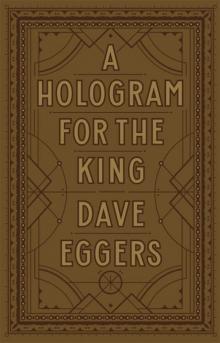 A Hologram for the King
A Hologram for the King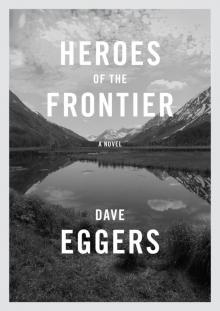 Heroes of the Frontier
Heroes of the Frontier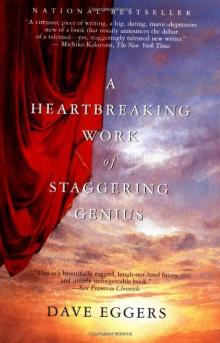 A Heartbreaking Work of Staggering Genius
A Heartbreaking Work of Staggering Genius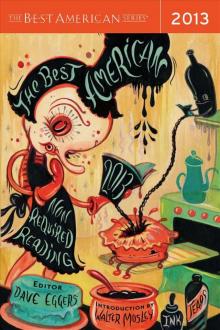 The Best American Nonrequired Reading 2013
The Best American Nonrequired Reading 2013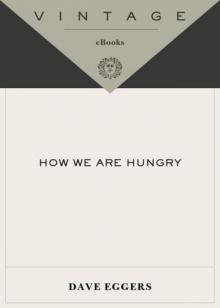 How We Are Hungry
How We Are Hungry The Circle
The Circle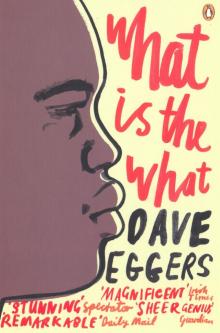 What is the What
What is the What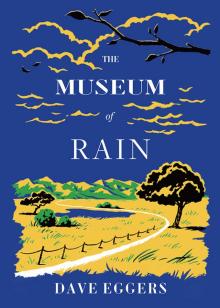 The Museum of Rain
The Museum of Rain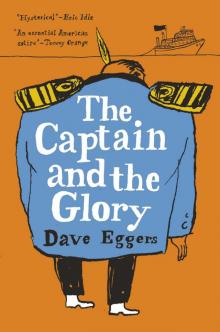 The Captain and the Glory
The Captain and the Glory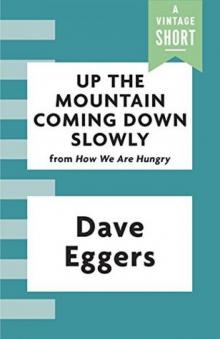 Up the Mountain Coming Down Slowly
Up the Mountain Coming Down Slowly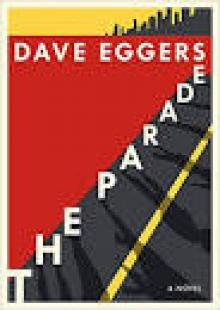 The Parade
The Parade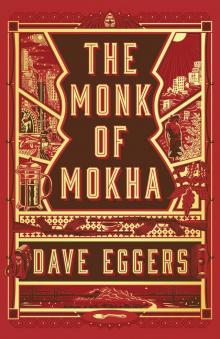 The Monk of Mokha
The Monk of Mokha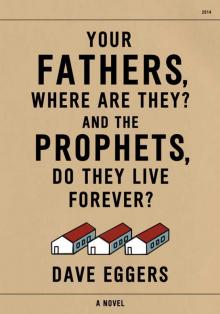 Your Fathers, Where Are They? And the Prophets, Do They Live Forever?
Your Fathers, Where Are They? And the Prophets, Do They Live Forever? You Shall Know Our Velocity
You Shall Know Our Velocity The Wild Things
The Wild Things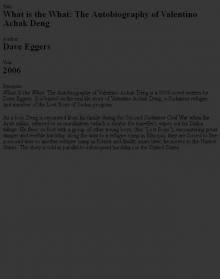 2006 - What is the What
2006 - What is the What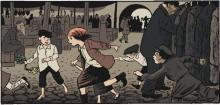 The Best American Nonrequired Reading 2011
The Best American Nonrequired Reading 2011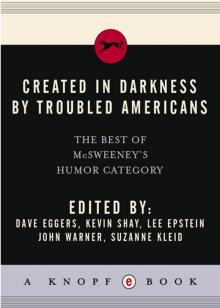 Created in Darkness by Troubled Americans
Created in Darkness by Troubled Americans